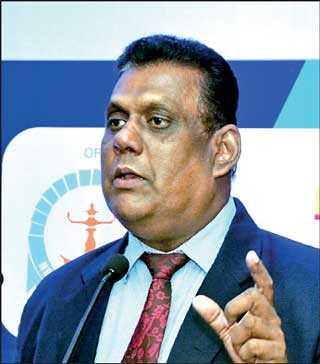Sunday Feb 22, 2026
Sunday Feb 22, 2026
Friday, 25 October 2019 00:00 - - {{hitsCtrl.values.hits}}
As a way of addressing existing challenges within the Sri Lankan labour market, Colombo University Senior Professor H.D. Karunaratne said the country needed to look for a way to produce professionals who met employer requirements and could satisfy the demands of an internationally competitive
 |
Senior. Prof. H.D. Karunaratne |
economy.
Delivering the keynote speech at the ‘Future of Sri Lanka: View of Political NextGen’ forum, Prof. Karunaratne said Sri Lanka should consider reforms in education to improve quantitative and qualitative standards in order to address existing challenges in the economy and labour market.
“Sri Lanka has to consider the qualitative and quantitative aspect of the education of the country. Around 25% of the youth were kicked out from the education as they were unable to pass the GCE Ordinary Level Examination. At the Advanced Level Examination, 30% of students were kicked out from the education system as they were unable to get three simple passes for all three subjects,” he said.
According to him, more than 82% of the students who passed the Advanced Level exam exited the education system as they were unable to access higher education through a proper higher education platform, with those left behind needing to be prepared for the modern job market.
“One of the most important things that we have to look at is how we can produce professionals and how to provide jobs by expanding vocational training.” Referring to the qualitative perspective of education, Prof. Karunaratne pointed out that even though the literacy rate in Sri Lanka was high, there was a lack of soft skills needed for employment.
He pointed out that Sri Lanka had not been able to provide education to improve English knowledge for the youth.
“There are 7,000 schools that teach in only Sinhala and 3,000 schools that teach in only Tamil. So how do we produce youth who can compete in the global job market?”
Prof. Karunaratne noted that ICT literacy needed to be improved in the country as a way of meeting modern requirements. He pointed out that ICT literacy would have to go beyond basic computer skills.
He stated that financial literacy was one of the most essential issues that the country had to address. According to Prof. Karunaratne, grassroots businesses suffered from a lack of financial literacy. “We need to promote financial literacy in primary and secondary education.”
Prof. Karunaratne argued that if the country failed to address labour market challenges and improve financial literacy, Sri Lanka would eventually become the poorest country in South Asia. “If this practice continues, I predict that in 10 years’ time Sri Lanka will be the poorest country in South Asia in terms of economic growth,” he said.
